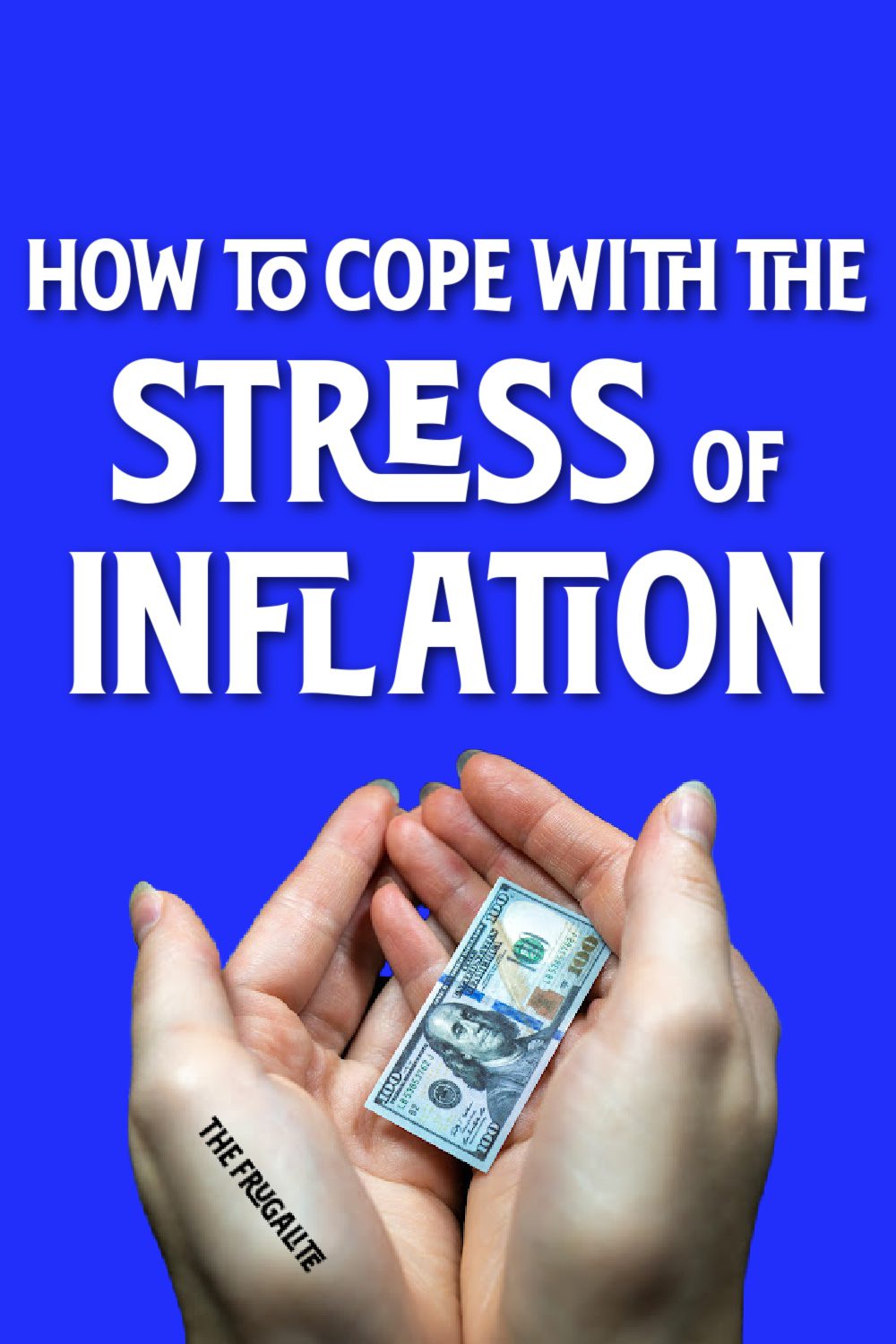(Psst: The FTC wants me to remind you that this website contains affiliate links. That means if you make a purchase from a link you click on, I might receive a small commission. This does not increase the price you’ll pay for that item nor does it decrease the awesomeness of the item. ~ Daisy)
By the author of The Flat Broke Cookbook and The Ultimate Guide to Frugal Living
If the stress of inflation is getting you down, you’re definitely not alone. A survey about stress in 2022 found that the vast majority of adults were worried about money this year.
Inflation was reported as a source of stress for the vast majority of adults (83%), and the majority of all adults also said the economy (69%) and money (66%) are a significant source of stress. Of those who said money is a source of stress, most said that stress is about having enough money to pay for basic needs. Slightly more than half of adults who reported money is a significant source of stress (55%) said money is a cause of fights or tension in their family compared with 41% of the general population who said the same. This may be partially due to having to make different choices due to lack of money.
Nearly three in five adults (57%) who indicated money was a source of stress said that having enough money to pay for things in the present—like food or rent/mortgage—is their main source of stress regarding money, while more than two in five adults (43%) reported feeling that saving enough money for things in the future is their main source of stress.
Dang. I feel that on a personal level.
If you aren’t feeling the heat, this article isn’t for you. Statistically, though, more than 8 out of 10 of us are worried.
When you are worried and stressed out, it’s hard to be effective. You may feel the urge to work non-stop or to eschew all things fun and pleasant. Alternatively, you might feel paralyzed by what seems like an insurmountable situation.
If you can manage your feelings of anxiety, you’ll be in a much better position to get through this. Here are some tips for managing the stress of inflation.
Avoid the urge to be constantly productive.
Going into hyper-productivity mode works for a while to combat the effects of inflation, but nobody can keep up the pace forever. You can set yourself up for a terrible cycle of stress by taking on too much. You’ll find that you quickly move into a state in which you simply can’t “shut it off.”
I get it. When things go sideways, all I want to do is fix it as fast as possible. But working yourself into the ground isn’t the way to do that unless your issue is strictly short-term and finite. If you are dealing with a big-picture, long-term financial crisis, going non-stop isn’t the way through it, no matter how much you want to fix it, fix it, fix it.
There are several risks when you try to be constantly productive:
- Poor sleep – I don’t know about you, but when I work from the time I get up til the time I go to bed, sleep is elusive at best and absent at worst. Insomnia is not your friend, and while you might be able to get by short-term with a sleep deficit, eventually, it will catch up with you. You need some downtime before bed so that you can wind down enough to get your rest.
- Weakened immune system – When you are constantly busy, chances are you aren’t eating well or sleeping well. This affects your immune system. Lack of sleep will also make you more susceptible to illness. When you’re in a weakened state, you are more likely to get sick, and that means a) you have to spend money on a doctor and medicine or b) you miss work, or c) both of the above.
- Difficulty managing emotions – When I’m stressed, I get moody fast. I am more prone to snapping at the people I love, more likely to be upset over something trivial, and find it difficult to be cheerful. This stuff all conspires against me – my bad mood then makes everything feel more hopeless, and that makes my situation even worse.
- Burnout – Finally, pushing yourself too hard for too long will lead to burnout. It’s not pretty – Colette wrote about it here. Burnout can affect every aspect of your life, from your professional skills to your personal relationships to your health. Once it happens, it can take months, if not years, to recover.
Take my advice – you have to pace yourself.
Know what you can control and what you can’t.
There are a lot of things you can control – the meals you plan, the money you spend on discretionary things, and choosing activities that don’t cost money for entertainment.
But there’s a lot going on right now that you can’t do a darn thing about. No matter how angry you get, how much you feel like you know the right answer, or how desperately you want to, there is absolutely nothing you can do about the overall economy. You can’t singlehandedly reduce inflation, control government policies, influence corporate decisions, or affect national decision-making. While I believe it’s important to stay informed, immersing yourself in all this day in and day out will just make you feel angry, helpless, and frustrated.
Focus your energy on the things that you can control and limit the attention you give to things you cannot. You can’t control the economy, but you can definitely mitigate the stress of inflation.
Let things go.
This is really hard, but sometimes you have to let things go. We’re in an economic situation right now in which our old way of life may no longer be sustainable.
Are there expenses you can cut even though it feels like a sacrifice? (Colette wrote about that here.) Perhaps it’s lessons or a hobby. Maybe you need to switch to being a one-car family. It could be that you need to change your entire living situation to be able to keep your head above water.
While the decision to let things go may be difficult, the relief you will feel afterward is immense. (Although I’ll be honest – sometimes it’s mixed with sadness.)
Make time for pleasant activities.
This is the place a lot of folks find to be a sticking point. When they’re feeling the stress of inflation, they feel guilty for enjoying themselves when their financial life is in shambles. I cannot encourage you strongly enough to try and get past that. You might be struggling to make ends meet, but you still deserve to be happy. Punishing yourself by living a spartan life with no joy will not help you through this situation any faster.
This website is absolutely loaded with ideas for entertaining yourself and your loved ones without spending much – if any- money. We have all sorts of suggestions for delicious yet frugal food, for family activities and special occasions, and for having a good mental attitude. Life is too short, and this economic situation will last too long for you to eschew all things pleasant until the situation resolves. Being miserable will not get you through this any faster.
I’ve noticed that after I give myself a little break, when I come back to the problem, I’m often able to attack it with a fresh perspective and more positivity. That is far more effective than sullenly trudging through my days due to the stress of inflation.
Is the stress of inflation getting to you?
If the stress of inflation is getting to you, you’re definitely in good company.
How are you managing it mentally? What concrete steps are you able to take? Let’s discuss how we’re handling the stress of inflation in the comments.
About Daisy
Daisy Luther is a coffee-swigging, adventure-seeking, globe-trotting blogger. She is the founder and publisher of three websites. 1) The Organic Prepper, which is about current events, preparedness, self-reliance, and the pursuit of liberty; 2) The Frugalite, a website with thrifty tips and solutions to help people get a handle on their personal finances without feeling deprived; and 3) PreppersDailyNews.com, an aggregate site where you can find links to all the most important news for those who wish to be prepared. Her work is widely republished across alternative media and she has appeared in many interviews.
Daisy is the best-selling author of 5 traditionally published books, 12 self-published books, and runs a small digital publishing company with PDF guides, printables, and courses at SelfRelianceand Survival.com You can find her on Facebook, Pinterest, Gab, MeWe, Parler, Instagram, and Twitter.












1 thought on “How to Cope with the Stress of Inflation”
Part of coping with inflation that pushes up the price of nearly everything is understanding how and why that happens. In contrast to price increases in just a few industries, across the board increases means that centralized counterfeiting of a nation’s money supply separates and steals purchasing power from the money a population holds. Centuries ago when that evil was committed by private people … it often resulted in a death penalty. When the Bank of England was created in 1694 to commit that same evil … it was done so that most people would not understand nor be able to hold that central bank accountable. During our American Revolution over-printing on our side plus deliberate counterfeiting by the British intended to destroy our money … worked together to cause near starvation. Memories of those bitter times were still fresh when the 1792 US Coinage Act specified the death penalty for anyone making US coins with other than the precious metal of silver.
After secret British money bought our 1912 presidential election for Woodrow Wilson (the British favorite to sign off on the coming Federal Reserve Act, the IRS, and US participation in the coming European civil war), central bank counterfeiting resulted in jacking up US prices considerably during and after WW1. Just like the Bank of England, the American Fed could not be held accountable. Today in the last couple of years the amount of such counterfeiting has ramped way up faster than ever before in US history. The effect of that is to steal much purchasing power and hand it to the Fed’s closest oligarch buddies to acquire all kinds of assets and businesses BEFORE the general price level ripples through the economy. That transfer (aka theft) of purchasing power is called the Cantillon Effect.
So how have people traditionally protected at least some of their purchasing power from such entrenched and centralized thievery? They converted as much of their cash as possible to physical assets, precious metals, divisible and portable commodities (grains, alcohol, chocolate, diamonds, personal skills, personal businesses, and investments in other businesses likely to thrive despite the troubled times. They also ramped up their skills for barter transactions. In our era there might be a place for using crypto currencies for some transactions but there are limits on where those might be accepted and other painful limits imposed by governments obsessed with protecting their money counterfeiting monopolies — just as communist China has banned all cryptos not owned and created by their government.
The looming tragedy in our era is the globalist push for a world-wide monopoly of digital money to replace cash. Some 90% of the world’s central banks are pursuing this tyrant’s wet dream — including our “own” Fed. That would destroy our 4th Amendment’s guarantee of privacy and give the government and central bank the power to not only counterfeit at will but also to approve or disapprove any kind of sale or purchase according to what is “politically correct” as the tyrants’ wishes change. It would also give government the ability to instantly and digitally extract taxes from your account — wherever in the world you might choose to live. It would also grease the skids to facilitate instant electronic digital counterfeiting without the burdens of creating physical money or going through the traditional banking industry.
Other implications of such a cashless economy mean that a long term power outage (such as simulated in July of 2021 by the WEF, called Cyber Polygon) would mean that the digital “coin of the realm” would instantly stop working. Another implication is the blatant access to your medical issues via the bodily implant designed to permit you to participate in that digital cashless economy.
Would you be forced to accept that implant to use digital money to pay your power bill, your water bill, your property taxes, your groceries, your gasoline, etc? Probably. Could you use parallel economy methods (cryptos, barter, etc) for some other types of transactions? Possibly. Could you ever be punished for using non-government-approved payment methods? Recall that the IRS wants a piece of your significant barter transactions today. In a digital money world the IRS would certainly insist on your using digital money to pay your tax even on barter (parallel economy) transactions.
One of the globalist/WEF goals is to obsolete the concept of all countries’ independent sovereignty — and for that to be replaced by whatever tyranny the WEF might impose. Regarding the US Constitution … that is a mere speed bump that the WEF plans to bulldoze into oblivion. The WEF plans would certainly replace our “land of the free and home of the brave” with “land of the fleeced and home of the enslaved.”
Daisy’s article today is supposed to be about methods to cope with the stress of inflation. I’ve discussed how people historically have compensated to some extent when governments have debased their countries’ money. I would expect that a cashless digital economy would leave as little room as possible for “stress reliever” alternate transaction methods. Such prospects might also help explain the lack of other comments so far today following several hours after Daisy’s posting.
–Lewis